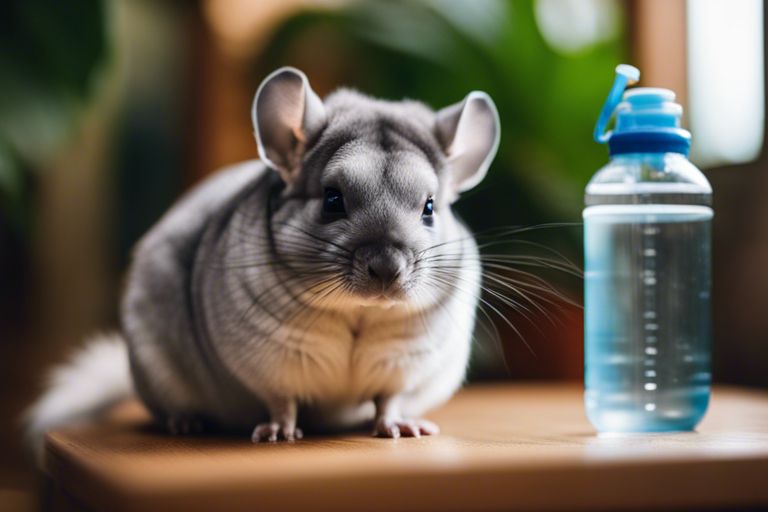Just like any living being, chinchillas require fresh water to stay healthy and active. Water is crucial for their bodily functions and plays a crucial role in their overall well-being. In this blog post, we will discuss the importance of providing fresh water to your chinchilla, as well as how often you should offer it to ensure their health and well-being.
Key Takeaways:
- Chinchillas should have access to fresh water at all times. Chinchillas are prone to dehydration, so it is crucial to provide them with a constant supply of clean water.
- Water bottles should be checked and refilled daily. Make sure to regularly clean and refill the water bottles to prevent contamination and ensure freshness for your chinchilla.
- Monitor your chinchilla’s water intake. Keep an eye on how much water your chinchilla is consuming daily as changes in water consumption can be an indication of health issues.

Understanding Chinchilla Drinking Habits
Natural Water Consumption Patterns
You may wonder how much water your chinchilla needs on a daily basis. Chinchillas are desert-dwelling animals and have developed a unique ability to conserve water. In the wild, they obtain most of their hydration from the plants they eat, such as grass and hay. This means that chinchillas have a lower thirst drive compared to other animals, and they may not drink water as frequently as you might expect.
Factors Influencing Water Needs
Chinchillas have specific factors that can influence their water consumption. These factors include temperature, humidity, diet, and activity level. In warmer temperatures or low humidity levels, chinchillas may need more water to stay hydrated. Their diet, which should consist mainly of hay and pellets, also plays a role in their water needs. Finally, chinchillas that are more active will require more water to maintain their energy levels. Assume that adjusting these factors may change how much water your chinchilla needs.
Influencing Factors
Another necessary factor that influences water needs in chinchillas is their health condition. If your chinchilla is ill or pregnant, their water requirements may increase. Additionally, chinchillas with certain medical conditions, such as kidney issues, may need more water to stay healthy. Monitoring your chinchilla’s water intake and observing any changes can help you understand their specific needs.
Best Practices for Water Provision
Types of Water Sources
The water source for your chinchilla is crucial to their health and well-being. They should have access to fresh, clean water at all times. You can provide water through water bottles or water bowls. It is imperative to choose a method that your chinchilla is comfortable with and that ensures a reliable water supply.
- Water Bottles: These are the most popular choice as they help prevent contamination and spillage.
- Water Bowls: Some chinchillas prefer drinking from bowls, but they can get dirty easily, so they need frequent cleaning.
- Gravity Feeders: These are convenient for providing a continuous supply of water without the need for frequent refills.
- Automatic Waterers: These are ideal for busy owners who need a system that refills itself automatically.
- Fountains: These provide aeration and filtration, ensuring a fresh water supply for your chinchilla.
Assume that your chinchilla’s water container is checked and refilled daily to prevent dehydration.
Cleaning and Maintaining Water Containers
On a regular basis, it is crucial to clean and sanitize your chinchilla’s water container to prevent the growth of harmful bacteria and algae.
Provision fresh water in a clean container every day to ensure your chinchilla’s well-being. Consider using vinegar and water solution or pet-safe disinfectants to clean the water container thoroughly. It is vital to rinse the container well before refilling it with water. Regular maintenance of the water container will help prevent illnesses in your chinchilla.
Monitoring Your Chinchilla’s Water Intake
Signs of Adequate Hydration
Keep an eye on your chinchilla’s water bottle to ensure they always have access to fresh, clean water. Chinchillas are known to drink frequently throughout the day, so it’s important to refill their water bottle as needed to prevent dehydration. Additionally, monitor their water intake by observing how often they visit the water bottle and how much they are drinking each time.
Warning Signs of Dehydration
Chinchillas can quickly become dehydrated, which can lead to serious health issues. It’s crucial to be vigilant for signs of dehydration, such as sunken eyes, lethargy, dry or sticky gums, or loss of appetite. If you notice any of these symptoms, it’s vital to take immediate action to increase your chinchilla’s water intake and consult with a veterinarian if needed.
With dehydration being a common concern in chinchillas, especially during hot weather or illness, it’s important to monitor your pet closely. Encourage your chinchilla to drink more water by providing fresh vegetables with high moisture content, such as celery or cucumber. Regularly check their water bottle to ensure it’s working properly and always filled with clean water to promote their overall well-being and prevent dehydration-related issues.
Conclusion
Summing up, it is crucial to provide your chinchilla with fresh water daily. This small and sensitive pet requires a constant supply of clean water to stay healthy and hydrated. Remember to change the water and clean the water bottle regularly to prevent any contamination or bacterial growth. By making sure your chinchilla has access to fresh water at all times, you are taking an necessary step in caring for their well-being and ensuring a happy and healthy life for your furry friend.
